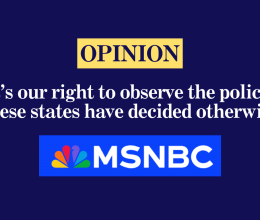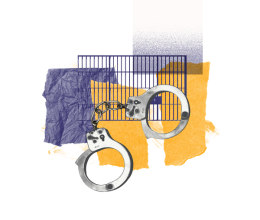NEW ORLEANS – As public health experts continue to sound the alarm about the threat of COVID-19 in overcrowded prisons and jails, Chief Justice Bernette Joshua Johnson urged district judges to take steps to avoid needless jail sentences and prevent people from being incarcerated because they cannot afford bail. The ACLU of Louisiana applauded the move, which is consistent with its call to reduce prison and jail populations to protect public health amid the COVID-19 pandemic.
“We commend the Chief Justice for recognizing the imminent threat COVID-19 poses to incarcerated people and the community at large,” said Alanah Odoms Hebert, ACLU of Louisiana executive director. “Public health experts have been warning that our prisons and jails could become powder kegs of this disease, putting additional strain on our hospitals and endangering millions of lives. Our study found that thousands of presumptively innocent Louisianans are languishing behind bars – often in crowded, squalid conditions – based on the mere accusation of a crime and an inability to pay bail. What was already a gross miscarriage of justice is now an imminent threat to public health. For the health and safety of their communities, we urge district judges to follow the Chief Justice’s recommendations and help prevent the spread of COVID-19.”
The Louisiana Department of Corrections has reported that 14 employees and five incarcerated people have confirmed cases COVID-19. A third individual incarcerated at a federal prison in Oakdale has also succumbed to the disease. Orleans Parish Prison, East Baton Rouge Parish Prison, and Jefferson Parish Prison also have confirmed cases of COVID-19.
The ACLU of Louisiana’s recent report – Justice Can’t Wait – found that Louisiana’s pretrial incarceration rate is now three times the national average and the highest of any state on record since 1970. The study, based on an analysis of thousands of jail records, found that 57 percent of people in jail had been arrested for non-violent offenses and that pretrial incarceration costs Louisiana taxpayers nearly $290 million per year. On average, the people represented in the study had been held behind bars for 5 and a half months – without trial or conviction.
From the outset of the COVID-19 pandemic, the ACLU of Louisiana has been communicating with state and local officials about protecting the health of people involved in the criminal legal system. In addition to urging prisons and jails to comply with CDC guidelines and educate people in custody and corrections staff, the ACLU of Louisiana has called for:
- Honoring the deadlines for charging and arraigning arrestees provided by Article 701 of the Code of Criminal Procedure;
- Instituting a presumption of release on recognizance and, when a statute prohibits release on recognizance, fixing only nominal bail. People should be held in jail only if there is clear evidence that they pose an imminent danger to a person;
- Lifting probation and parole holds for technical violations, and ending such holds on people until further notice;
- Releasing high-risk and medically-frail adults and children from prison and juvenile facilities;
- Releasing individuals from pretrial detention who do not pose a risk to the community;
- Ensuring incarcerated people have unfettered access to confidential phone calls with civil and criminal attorneys;
- Offering free access to hygiene supplies such as soap, hand sanitizer, and other supplies to people who are incarcerated;
- Planning for the screening and testing of incarcerated people in custody;
- Ending co-pays for health services in prison facilities;
- Waiving fees for phone and videoconference calls to preserve incarcerated people’s ability to communicate with friends and family;
- Avoiding lockdowns, which inflict substantial, serious mental harm on incarcerated populations;
- Extending good-time credit by issuing an emergency, 90-day, good-time credit to allow the release of anyone within 90 days of going home;
- Signing clemency petitions that are pending review and approval;
- Reducing jail admissions by reclassifying misdemeanor offenses that do not threaten public safety into non-jailable offenses, using citations instead of arrests for all crimes that do not involve violence, and diverting as many people as possible to community-based mental health and substance abuse treatment; and
- Releasing youth who pose no imminent and substantial danger to the community.






